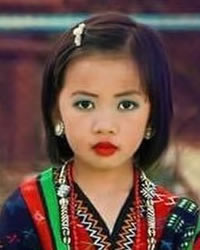Lungwah in Myanmar (Burma)

Photo Source:
Asia Harvest-Operation Myanmar
|
Send Joshua Project a map of this people group.
|
| People Name: | Lungwah |
| Country: | Myanmar (Burma) |
| 10/40 Window: | Yes |
| Population: | 1,500 |
| World Population: | 1,500 |
| Primary Language: | Chin, Falam |
| Primary Religion: | Christianity |
| Christian Adherents: | 100.00 % |
| Evangelicals: | 50.00 % |
| Scripture: | Complete Bible |
| Ministry Resources: | Yes |
| Jesus Film: | Yes |
| Audio Recordings: | Yes |
| People Cluster: | Kuki-Chin-Mizo (Zo) |
| Affinity Bloc: | Tibetan-Himalayan Peoples |
| Progress Level: |
|
Identity
The Lungwah have never previously been identified as a distinct people group, although they were first shown on a 2019 linguistic map of Chin State.1 In the past the Lungwah may have been viewed as one of several subgroups of the Falam Chin, but their customs and dialect are different from those of other tribes.
Location: Numbering just 1,500 people in three villages of north-central Chin State, the Lungwah are one of the smallest and least known of the more than 60 Chin tribes in Myanmar. Their three villages (Farso, Khuaimual, and Lungwah) and located north of the key town of Falam. The Lungwah inhabit a tiny area, flanked by five different Chin tribes: the Phadei and Siyin to the north; Tapong to the west; Ngawn to the north; and Zanniat to the east. The Taisun and several other groups are located a little further distant.
Language: With Chin State currently mired in a state of turmoil due to the civil war and societal breakdown, researchers have been unable to determine the relationship between Lungwah and other Chin languages in the area, although most believe it is a variety of Falam Chin, which is part of the Central Lai branch of the Tibeto-Burman linguistic family.
History
Accounts of warfare between the Chin people and invading forces are well documented, but fewer people know that after Burma independence was declared in 1948, many Chin men volunteered to serve in the Burmese army. With inflation plunging many Chin families into poverty, “the army not only provided an opportunity for a young man to venture into the world outside Chin country, but it also provided an opportunity to earn money, which was not possible in the hills. Supplied with their rations and uniforms, army personnel could save all their pay and after some years return home to build a house with a corrugated iron roof. The army was seen as a source of education, disciplines, and money. Soldiers were respected, and they could choose any of the girls in the village for marriage.”
Customs
Hunting and fishing have long played major roles in Lungwah society, with the area being home to rugged mountain ranges and fast-flowing rivers. Falam, which is home to over 40,000 people, serves as a key town and trading hub and stretches as far as Myanmar's border with Mizoram, India. Falam also contains the large Laiva Dam, which provides electricity to a large part of the state.
Religion
After spirit worship and fear of demons had dominated their communities for centuries, the Lungwah and other tribes in the area gradually converted to Christianity during the 20th century. Many families had grown tired of living in bondage to shamans, whose services required payment. A continual flow of sacrifices was demanded to cure sickness, perform an exorcism, or hold a wedding or funeral. Animals ranging from chickens to pigs and livestock were sacrificed, which poor families could not afford. When they heard that faith in Jesus would give them inner peace and joy, and they would not have to sacrifice to the spirits anymore, oppressed people flocked to God in large numbers.
Christianity
The honor of being the first Chin believer in the Falam area belongs to a man named Thang Sin, who was baptized in September 1906. The seed of the Gospel took root and produced a harvest in the following decades, with thousands turning to Christ in the 1960s and 1970s. It was said: “The impact of Christianity in the socio-economic and cultural life of the Falam tribes was profound. It brought enlightenment to the minds of common people…and tamed the temperament of people.” It is thought that all Lungwah people are Christians today, with churches in each of their villages. No Scripture or any other Christian resources have ever been produced in the Lungwah dialect. To compensate, believers use the Falam Chin Bible.